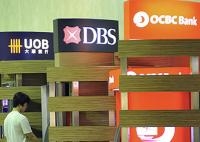
Should Singapore banks be worried about escalating oil & gas default risks?
Another Malaysian O&G firm defaulted on bonds worth $125m.
Perisai Petroleum's bond default is symptomatic of financial strains across much of south-east Asia's oil & gas service industry. Singapore banks are exposed to credit risks emanating from the sector, but are well-placed to withstand potential losses, says Fitch Ratings.
Fitch believes Singapore banks are securely positioned to withstand further asset-quality deterioration, given their disciplined underwriting standards and healthy provision buffers of just over 100% (as a proportion of NPLs). Adequate profitability, sound funding and liquidity positions, and strong capitalisation also support Singapore banks' 'AA-' ratings, which the agency affirmed in May with Stable Outlooks.
Here's more from Fitch:
Perisai Petroleum, a Malaysian offshore oil & gas service provider, defaulted on bonds worth SGD125m (USD90m) on 3 October after bondholders rejected the company's restructuring plans. Perisai has other debt - worth around MYR791m (USD260m) at end-June 2016 - with major Singaporean and Malaysian banks likely to be among the main creditors.
The combined oil & gas exposure of Singapore's three rated banks - DBS, OCBC and UOB - was SGD51.3bn at end-June 2016. This represented 55% of their combined core equity Tier 1 (CET1) capital. This may seem high, although the majority of their oil & gas exposure is collateralised. Furthermore, only SGD17bn of this exposure is to the more vulnerable subsector of offshore support services, accounting for 18% of banks' CET1 capital.
The weighted-average NPL ratio for these three banks remained low at 1.23%, but we expect this to rise modestly as more oil & gas-related NPLs emerge.
Perisai's case is far from isolated. A number of other regional oil & gas service companies have also run into trouble this year. Swiber Holdings filed for creditor protection in July, leading DBS to classify SGD651m of its SGD721m exposure to the troubled group as non-performing, with the remainder expected to be classified in the third quarter. Swissco Holdings on 4 October appointed Ernst & Young to assist in the refinancing and restructuring of SGD100m worth of bonds due in 2018. The others in various stages of debt reorganisation include AusGroup and Marco Polo Marine.
Fitch had expected the credit metrics of south-east Asian oil and gas issuers to deteriorate this year. The sector is on negative outlook, and we have made multi-notch downgrades on the ratings of oilfield-service companies in the region. Upstream oil producers are still actively looking to reduce costs despite recent rises in oil prices to just over USD50/bbl. Oil & gas service companies have been at the sharp end of the negative effects from investment cuts by oil producers, as well as cost-reductions that have led to lower day-rates for equipment, machinery and services. Small operators like Perisai are especially vulnerable. Larger companies that have more diversified revenue streams or strong balance sheets are better placed to withstand the investment cutbacks.
























 Advertise
Advertise









